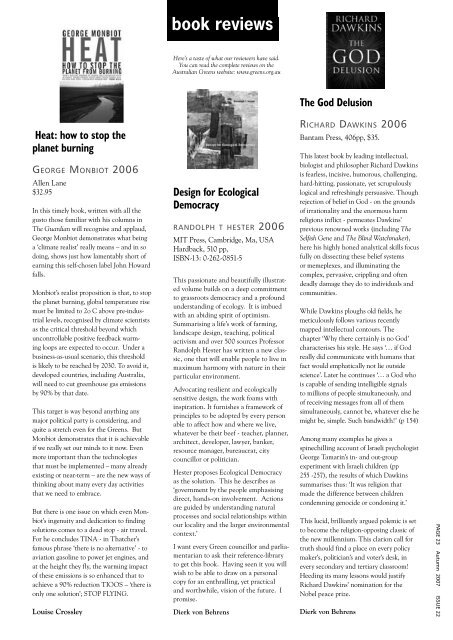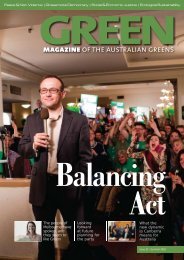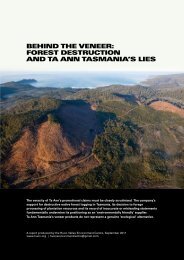news & views - Australian Greens
news & views - Australian Greens
news & views - Australian Greens
You also want an ePaper? Increase the reach of your titles
YUMPU automatically turns print PDFs into web optimized ePapers that Google loves.
Heat: how to stop the<br />
planet burning<br />
GEORGE MONBIOT 2006<br />
Allen Lane<br />
$32.95<br />
In this timely book, written with all the<br />
gusto those familiar with his columns in<br />
The Guardian will recognise and applaud,<br />
George Monbiot demonstrates what being<br />
a ‘climate realist’ really means – and in so<br />
doing, shows just how lamentably short of<br />
earning this self-chosen label John Howard<br />
falls.<br />
Monbiot’s realist proposition is that, to stop<br />
the planet burning, global temperature rise<br />
must be limited to 2o C above pre-industrial<br />
levels, recognised by climate scientists<br />
as the critical threshold beyond which<br />
uncontrollable positive feedback warming<br />
loops are expected to occur. Under a<br />
business-as-usual scenario, this threshold<br />
is likely to be reached by 2030. To avoid it,<br />
developed countries, including Australia,<br />
will need to cut greenhouse gas emissions<br />
by 90% by that date.<br />
This target is way beyond anything any<br />
major political party is considering, and<br />
quite a stretch even for the <strong>Greens</strong>. But<br />
Monbiot demonstrates that it is achievable<br />
if we really set our minds to it now. Even<br />
more important than the technologies<br />
that must be implemented – many already<br />
existing or near-term – are the new ways of<br />
thinking about many every day activities<br />
that we need to embrace.<br />
But there is one issue on which even Monbiot’s<br />
ingenuity and dedication to finding<br />
solutions comes to a dead stop - air travel.<br />
For he concludes TINA - in Thatcher’s<br />
famous phrase ‘there is no alternative’ - to<br />
aviation gasoline to power jet engines, and<br />
at the height they fly, the warming impact<br />
of these emissions is so enhanced that to<br />
achieve a 90% reduction TIOOS – ‘there is<br />
only one solution’; STOP FLYING.<br />
Louise Crossley<br />
book re<strong>views</strong><br />
Here’s a taste of what our reviewers have said.<br />
You can read the complete re<strong>views</strong> on the<br />
<strong>Australian</strong> <strong>Greens</strong> website: www.greens.org.au<br />
Design for Ecological<br />
Democracy<br />
RANDOLPH T HESTER 2006<br />
MIT Press, Cambridge, Ma, USA<br />
Hardback, 510 pp,<br />
ISBN-13: 0-262-0851-5<br />
This passionate and beautifully illustrated<br />
volume builds on a deep commitment<br />
to grassroots democracy and a profound<br />
understanding of ecology. It is imbued<br />
with an abiding spirit of optimism.<br />
Summarising a life’s work of farming,<br />
landscape design, teaching, political<br />
activism and over 500 sources Professor<br />
Randolph Hester has written a new classic,<br />
one that will enable people to live in<br />
maximum harmony with nature in their<br />
particular environment.<br />
Advocating resilient and ecologically<br />
sensitive design, the work foams with<br />
inspiration. It furnishes a framework of<br />
principles to be adopted by every person<br />
able to affect how and where we live,<br />
whatever be their beef - teacher, planner,<br />
architect, developer, lawyer, banker,<br />
resource manager, bureaucrat, city<br />
councillor or politician.<br />
Hester proposes Ecological Democracy<br />
as the solution. This he describes as<br />
‘government by the people emphasising<br />
direct, hands-on involvement. Actions<br />
are guided by understanding natural<br />
processes and social relationships within<br />
our locality and the larger environmental<br />
context.’<br />
I want every Green councillor and parliamentarian<br />
to ask their reference-library<br />
to get this book. Having seen it you will<br />
wish to be able to draw on a personal<br />
copy for an enthralling, yet practical<br />
and worthwhile, vision of the future. I<br />
promise.<br />
Dierk von Behrens<br />
The God Delusion<br />
RICHARD DAWKINS 2006<br />
Bantam Press, 406pp, $35.<br />
This latest book by leading intellectual,<br />
biologist and philosopher Richard Dawkins<br />
is fearless, incisive, humorous, challenging,<br />
hard-hitting, passionate, yet scrupulously<br />
logical and refreshingly persuasive. Though<br />
rejection of belief in God - on the grounds<br />
of irrationality and the enormous harm<br />
religions inflict - permeates Dawkins’<br />
previous renowned works (including The<br />
Selfish Gene and The Blind Watchmaker),<br />
here his highly honed analytical skills focus<br />
fully on dissecting these belief systems<br />
or memeplexes, and illuminating the<br />
complex, pervasive, crippling and often<br />
deadly damage they do to individuals and<br />
communities.<br />
While Dawkins ploughs old fields, he<br />
meticulously follows various recently<br />
mapped intellectual contours. The<br />
chapter ‘Why there certainly is no God’<br />
characterises his style. He says ‘… if God<br />
really did communicate with humans that<br />
fact would emphatically not lie outside<br />
science’. Later he continues ‘… a God who<br />
is capable of sending intelligible signals<br />
to millions of people simultaneously, and<br />
of receiving messages from all of them<br />
simultaneously, cannot be, whatever else he<br />
might be, simple. Such bandwidth!’ (p 154)<br />
Among many examples he gives a<br />
spinechilling account of Israeli psychologist<br />
George Tamarin’s in- and out-group<br />
experiment with Israeli children (pp<br />
255 -257), the results of which Dawkins<br />
summarises thus: ‘It was religion that<br />
made the difference between children<br />
condemning genocide or condoning it.’<br />
This lucid, brilliantly argued polemic is set<br />
to become the religion-opposing classic of<br />
the new millennium. This clarion call for<br />
truth should find a place on every policy<br />
maker’s, politician’s and voter’s desk, in<br />
every secondary and tertiary classroom!<br />
Heeding its many lessons would justify<br />
Richard Dawkins’ nomination for the<br />
Nobel peace prize.<br />
Dierk von Behrens<br />
PAGE 23 Autumn 2007 ISSUE 22












